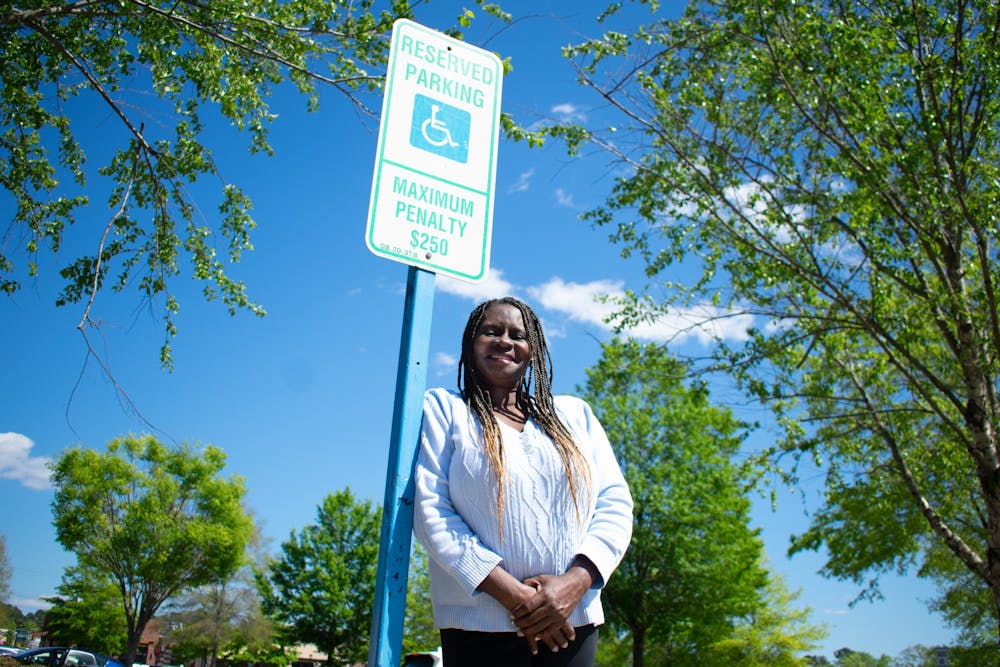In 2010, the Americans with Disabilities Act Standards for Accessible Design was revised to include regulations for Titles II and III of the 1990 ADA. These standards set parameters for the number of accessible parking spaces in relation to the number of non-accessible parking spaces.
ADA Standards also required accessible spaces to create the shortest possible route to the accessible entrance of the facility that they're connected to.
Dwight Bassett, the director of economic development and parking services for the Town of Chapel Hill, said that the Town is currently abiding by all state laws regarding ADA requirements.
“We’re going through an audit right now to make sure we’re currently up to standard with all that we do for ADA,” he said. “Generally those requirements are quite fair and reasonable from the standpoint of accessibility.”
Sarah Poulton, downtown special projects manager for the Town of Chapel Hill, said the audit is a part of the Town’s ADA Transition Plan. The plan seeks to identify factors that limit accessibility in Chapel Hill and make improvements in the identified areas.
Poulton said that while the transition plan includes studying issues related to parking, there are also a number of other factors to be considered, including facilities, sidewalks, crosswalks, programs and services.
“I really think we have the best team out there in the private sector helping us,” she said. “To do it right, it just takes time. That’s what we’re learning every day about this.”
Miles said he believes it’s important to communicate with the disabled community when there are plans for redoing or reconstructing parking. He added he does not think that there has been enough action from the Chapel Hill government in regard to accessible parking.
“They should always seek out organizations such as (the Triangle Disability Awareness Council) and whoever else will be using the area to see where spaces have been a problem to park for people with disabilities,” he said.
Financial barriers
To get the day's news and headlines in your inbox each morning, sign up for our email newsletters.
Parking accessibility also poses an issue for Chapel Hill residents and UNC students who must tackle the cost of parking in the area.
The Town of Chapel Hill offers 12 off-street parking locations, each of which cost $1.50 per hour from 8 a.m. to 8 p.m. from Monday through Saturday. On-street parking costs $1.75 per hour from 8 a.m. to 6 p.m.
“The provision and construction of parking by the Town is something that has to compete with other priorities,” said Josh Mayo, transportation planner for the Town of Chapel Hill. “As such, it’s important to keep a competitive parking program that can pay for itself.”
Any vehicle with a placard for accessible parking can park in any space for free in downtown Chapel Hill without being ticketed or fined.
Bassett said that parking services are meant to be self-sustaining — funds received are used to maintain the operation.
“Our parking fees are market-based — we don’t arbitrarily set rates,” he said. “We try to do it for the benefit and the economic vitality of downtown."
Reis Phillips, a store associate at Underground Printing and a senior at UNC, said she was frustrated with paid parking in Chapel Hill because it creates a financial barrier for those who are low-income.
“I do think sometimes people will just not come because they can’t pay the five or six dollars,” she said.
In her own life, she typically must choose between paying for parking or using the bus system to get to work.
“Most students have to take jobs that are minimum wage or not salaried,” Phillips said. “If you have to pay to park, it’s always taken out of that. Already, you don’t make a ton of money.”
Taking the bus will sometimes result in Phillips showing up to work late, which she said is a poor reflection on her. She added that the cost of parking likely leads to some residents not visiting Franklin Street altogether.
"We are the people who support this community and spend money here and live here — but we can't afford to pay to park here," she said.
@sam_long16 | @DTHCityState
city@dailytarheel.com | elevate@dailytarheel.com
CORRECTION: An earlier version of this article misquoted Dwight Bassett, the director of economic development and parking services for the Town of Chapel Hill. In his quote, he said vitality, not volatility. The Daily Tar Heel apologizes for this error.
CLARIFICATION: The article has been updated to reflect additional information about how those with a placard for accessible parking are able to park in downtown Chapel Hill for free without being fined or ticketed. The Daily Tar Heel apologizes for this error.



